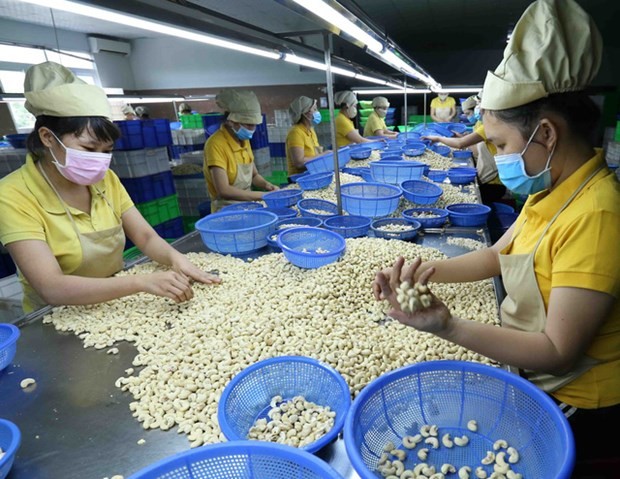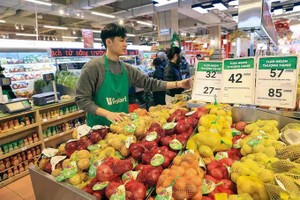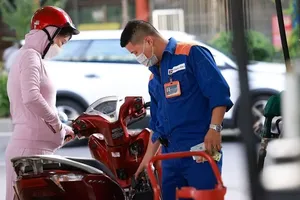 Workers at a cashew processing plant in southern Vietnam. In Vietnam, 52% of businesses have experienced fraud or economic crime. (Photo: VNA)
Workers at a cashew processing plant in southern Vietnam. In Vietnam, 52% of businesses have experienced fraud or economic crime. (Photo: VNA)
This was heard at a workshop "Prevention of disputes and fraud in international trade - experiences for Vietnamese businesses from the case of cashew nut containers" held in Hanoi on August 23.
In March, the business community expressed concern regarding a case in which cashew nut containers had problems with shipping documents sent to Italy and Turkey, meaning there was a risk the shipments would be lost.
With the desire to share experiences on the case with the business community as well as help improve their understanding of international commercial law, the Vietnam Chamber of Commerce and Industry (VCCI) in collaboration with the Ministry of Industry and Trade organised the event. This also aimed to identify similar risks in commercial activities; thereby preventing and avoiding disputes and fraud when implementing import-export transactions.
Dau Anh Tuan, head of VCCI’s Legal Department, said according to the Global Association of Anti-Fraud Professionals, every year, businesses globally are scammed and lose about 5% of their revenue. The average scam is worth about US$1.7 million. In 2022 alone, up to 46% of global businesses said they were victims of fraud and economic crime.
In Vietnam, 52% of businesses have experienced fraud or economic crime in the two years before the survey, higher than the 46% rate in the Asia-Pacific region and 49% globally. Meanwhile, Vietnamese businesses have not paid attention to anti-fraud measures. Also, there are few Vietnamese enterprises reporting to the management agency for fear of information being leaked to the public.
He hoped that experts, associations and the business community seriously consider this problem and find solutions to avoid such scams and minimise losses due to fraud.
Bah Khanh Nhut, Vice Chairman of the Vietnam Cashew Association (Vinacas), spoke about the fraud of 76 containers of cashew exports to Italy and gave recommendations to associations and businesses in other economic sectors and fields.
He said in this case, Vietnamese businesses were overly trusting of brokerage companies and did not check out information. During the COVID-19 pandemic, large orders made it easy for businesses to be negligent because they wanted to sell goods; especially at a time when there were few transactions in the market. In addition, the payment method has risks.
He said, in international business, the role of a broker is very important, but businesses need to have an independent check on partners. This is why the role of the Trade Office in foreign countries is very important.
“Local firms need to be alert to unusual signs from partners; although, scammers often use very sophisticated tricks. They should use more secure payment methods and exchange information with colleagues to detect signs of fraud. It is necessary to report it quickly and ask for the help of industry associations when the incident occurs. At the same time, businesses need to be proactive and make efforts in solving their own cases," he added.
Ngo Khac Le, an arbitrator of Vietnam International Arbitration Centre and Deputy General Secretary of Vietnam Logistics Business Association, suggested that Vietnamese firms could appoint a collection bank or require a deposit to limit losses and prevent risks. They should be more cautious when dealing with new partners for the first time. They should also call to find out the specific person's name, mobile number and use the company's email address to make it easier to identify the person or company in the future.
Lawyer Phan Vu Anh, Head of the Legal Department, inspector of Northern Food Corporation, said that when resolving disputes, businesses should pay attention to the specificity of each country and market.
“For example, if in a country with strong businesses and long-standing partners, we may be willing to accept the host country's arbitration agency. But in case we do not have a relationship, it is difficult to access information, businesses need to change their approach,” he said.
He added that even when winning in overseas disputes, the enforcement is also very complicated. Therefore, businesses need to approach and choose a dispute resolution unit suitable to the actual conditions.
He also noted that businesses always have to build many scenarios to anticipate and respond to risks. At the same time, it is very important to determine how to build business relationships with the Vietnamese Trade Office abroad because even if there is no dispute, businesses can still receive a lot of support from these agencies.
























